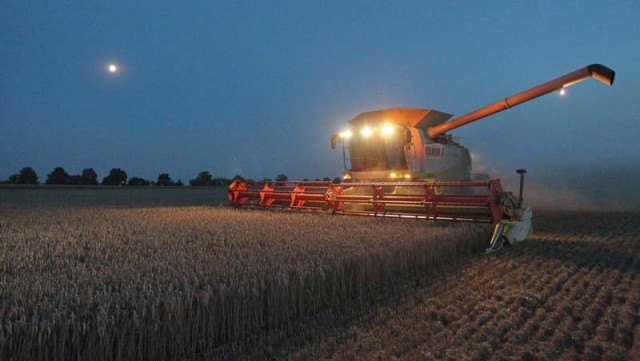PM likely to announce agriculture relief package
Amid tight budget, government looks to cut farmers’ losses

The government is working on two aspects - sharing losses with the farming community by giving them cash subsidies and announcing new support prices for major crops. PHOTO: AFP
Prime Minister Nawaz Sharif is likely to unveil an agriculture relief package next week after a slump in commodity prices has adversely affected growers who, in some cases, are unable to recover the cost of production.
The premier has directed the Ministry of Finance to finalise the package amid a limited fiscal space due to the tight budget deficit target assigned by the International Monetary Fund (IMF) for this fiscal year.
The back and forth meetings to finalise the package were held on Monday in Prime Minister’s Office and in Ministry of Finance, according to officials. So far, the focus remained on assessing the losses to the farming community and the assistance required for them to at least recover their cost of production, they added.
The government is working on two aspects - sharing losses with the farming community by giving them cash subsidies and announcing new support prices for major crops, said the officials of Ministry of National Food Security and Research.
So far, the initial discussions have taken place but details have not been finalised, said Punjab Finance Minister Ayesha Ghaus Pasha. She said the package will be finalised in a few days and the Prime Minister would announce the details.
The federal government showed seriousness only after opposition parties criticised it for the inaction.
The farming community also protested outside the Punjab Assembly recently to raise their issue.
On average, the prices of rice and cotton have further plunged by at least 25% when compared with the last season, said an agriculture specialist working with the Ministry of Planning and Development.
The cotton seed is traded at Rs1,800 to 2,000 per mound as against last year’s rate of Rs3,000. The rice prices have dropped to an alarmingly low level.
In November last year, the Economic Coordination Committee of the Cabinet had approved Rs10 billion as the rice subsidy package. However, the package remains unimplemented, creating doubts about the government’s ability.
The main reason behind non-implementation of the earlier package was lack of finances, said the officials. This time, the fiscal space is even tighter than the previous year.
“Whatever has to be done, it will be done within the available fiscal space,” said an official of the Ministry of Finance, while hinting at the limitation of restricting budget deficit to 4.3% of GDP.
Agriculture experts also blame the federal government for growing losses. “At a critical juncture, the government has increased the prices of gas used in urea manufacturing,” said Senator Mohsin Leghari, a landlord hailing from southern Punjab.
He said the urea prices were already skyrocketing due to imposition of Gas Infrastructure Development Cess (GIDC). Leghari feared that the manufacturers would again pass on the impact of increase in gas prices to the farmers by increasing prices of their products.
The lack agriculture credit was also a reason behind low productivity. The gap between credit demand and supply was more than Rs500 billion, according to Zarai Taraqiati Bank Limited. The federal government remains the banking sector’s single largest borrower.
Published in The Express Tribune, September 8th, 2015.
Like Business on Facebook, follow @TribuneBiz on Twitter to stay informed and join in the conversation.





1733130350-0/Untitled-design-(76)1733130350-0-208x130.webp)











COMMENTS
Comments are moderated and generally will be posted if they are on-topic and not abusive.
For more information, please see our Comments FAQ